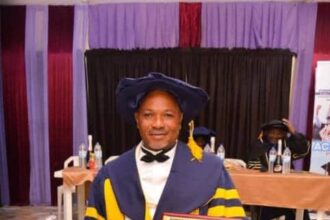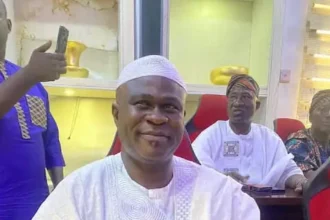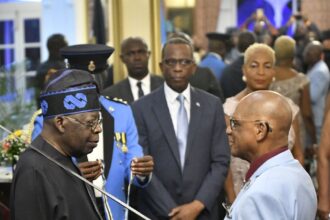...To get all news updates, Join our WhatsApp Group (Click Here)
Also Join our WhatsApp Channel (Click Here)
An investigation has revealed huge funds warehoused offshore that Governor of Kebbi State, Abubakar Bagudu used to help the Sani Abacha family steal from Nigeria in the 1990s.
Investigation revealed how he dispatched a delegation to Singapore in search of a new haven to shelter his controversial wealth, which is a target of ongoing forfeiture proceedings by the United States Department of Justice.
The investigation is part of the global International Consortium of Investigative Journalists (ICIJ)-led Pandora Papers project, which Premium Times is a part of.
Referred by Farrer and Co., a prestigious centuries-old London law firm that has represented the British royal family, Bagudu’s choice of secrecy provider in Singapore was Asiaciti Trust, an entity notorious for helping clients hide behind opaque offshore trusts to launder dirty money across borders.
Bagudu’s delegation on February 23, 2010 – comprising his brother, Ibrahim Bagudu, and London lawyer, Ben Davies, from Byrne and Partners, now a part of PCB Byrne – met with Asiaciti’s officials and registered his preference for a new structure of secrecy to oil the flow of his dirty wealth for the benefits of himself and his family.
In 1997, some 13 years earlier, the governor had structured offshore holdings Ridley Trust and Ridley Group in notorious tax and secrecy havens, Guernsey and the British Virgin Islands, positioning himself as the unseen but ultimate beneficiary. But in 2010, he wanted to terminate the Ridley structure and transfer his assets into another structure, hence the need for Asiaciti’s service in Singapore.
The reason, according to a 2010 Asiaciti memo, was control. As noted in the memo, Ibrahim told the February 2010 meeting that his brother, Bagudu – “the client” – had become “disillusioned” with institutional and independent trustees (of the Ridley Trust) as they (he and his brother) had no control over their action or inaction and suggested they feared they could lose the hidden assets.
He then insisted that any new trustee arrangements to be erected in Singapore “must ensure that the family cannot lose ‘control’ of the assets.”
In the months that followed, 99million euros in cash and securities was then transferred from Ridley to a new structure enabled by Asiaciti, which brushed aside red flags about Mr Bagudu’s controversial background and source of his wealth. Asiaciti acted with advice from Farrer and Co. and Byrne and Partners, now a part of PCB Byrne, documents showed.
Bagudu is long known to have played an instrumental role in the Abacha conspiracy to steal and launder billions of dollars belonging to Nigeria. But how he set up complicated structures of secrecy to hide stolen money as well as the role of his enablers, including prestigious British law firms and Serious Organised Crimes Agency (SOCA) the predecessor of the National Crimes Agency (NCA), has never been crystal clear.
The report read partly, “As documents showed, Asiaciti helped Mr Bagudu to set up a multi-layered structure with footprints in at least three countries, namely Singapore, Cook Islands, and the United Kingdom. At the head of the structure is Blue Holdings Trust, registered in Cooks Island as a “purpose trust” to “wholly” own a Singapore-incorporated private trust company, Blue PTC Pte Ltd., with Mr Bagudu’s brother, Ibrahim, and an Asiaciti nominee as directors.
“The Blue PTC Pte Ltd is in turn the trustee of two family trusts – Blue Family Trust (1) and Blue Family Trust (2). Under each trust, then, is a Singapore family-owned investment holding company, FHIC, Blue Holdings (1) Pte Limited, and Blue Holdings (2) Pte Limited, respectively.
“The beneficiaries of each of the family trusts and the corresponding investments domiciled in London were Mr Bagudu, his wife, seven children, and his brother, Ibrahim. In September 2010, according to minutes of some meetings we reviewed, a sum of 99 million euros was moved from Ridley through the Blue PTC in Singapore to the investment accounts in London and distributed as follows: Blue Holdings (1) (17,007,016 euros): Waverton – seven million euros; James Hambro – 10,007,016 euros. Blue Holdings (2) (81,841,163 euros): Waverton – 23 million euros; James Hambro – 58,841,163 euros.
“The systematic plunder of Nigeria by the Abacha family as well as the worldwide hunt for the stolen funds, worth billions of dollars, is reckoned to be one of the worst cases of kleptocracy and offshore shenanigans in the world. Between 1998, when Mr Abacha suddenly died, and 2020, 3.6 billion U.S. dollars have been recovered from the Abacha family and their most prolific bagman, Mr Bagudu, now a governor in Nigeria’s impoverished Kebbi State.
“The 163 million U.S. dollars recovery from Jersey in 2003 directly involved Mr Bagudu, who then negotiated a deal with the U.S. and Jersey to return the funds to Nigeria in exchange for Jersey’s withdrawal of an extradition request and his free return to Nigeria. He spent six months in American federal prison in Houston while awaiting extradition to Jersey. The deal to return the $163 million was to avoid that extradition.
“Also, the latest recovery – 308 million U.S. dollars from Jersey in 2020 – was laundered by Mr Bagudu. Mr Bagudu was involved with all the offshore front companies and bank accounts – from the British Virgin Islands to Ireland, Switzerland, England, Guernsey, and Jersey – used to steal and launder billions of dollars belonging to Nigeria under the Abacha regime as a director, signatory on accounts or prime beneficiary, according to U.S. court documents and incorporation filings from the Pandora Papers leaks.
“In stealing the funds, Mr Abacha set up what Africa Confidential described as a “Plunder Machine,” involving his family, officials, and associates such as Mr Bagudu, complemented by established western and local banks and offshore enablers. According to American investigators, the initial funding of Mr Bagudu’s Ridley’s account at Credit Agricole Indosuez, London, to the tune of 90 million U.S. dollars in 1998 was from the Par bonds and the debt-buy-back fraud.
“The Ridley assets were later transferred to the Blue structure facilitated by Asiaciti and are the outstanding defendant assets being targeted for forfeiture by the United States, court documents showed. The U.S. filed its forfeiture litigation in 2014. It said, then, the assets held by the Blue holdings, traceable to the old Ridley structure, and domiciled in London investment portfolios held with Waverton and James Hambro, were last valued at a total of 96 million euros.”
In 2020, the US government opposed a move by Nigeria to hand over $110 million to Bagudu.
According to Bloomberg, the money is part of the Abacha loot to be repatriated.
The Kebbi governor’s assets were seized along with Abacha’s because they were considered to be his reward for the “services” he rendered to the military head of state.
Court documents had showed that the payment was a product of a 2018 agreement between Bagudu and the Nigerian government.
Other documents also revealed that the Muhammadu Buhari administration was then vigorously challenging a move by the United States government to further question Bagudu, his elder brother in relation to the laundered fund.
The administration also fought to thwart America’s effort to remove the confidential classification of the agreements, which would make available for public scrutiny as well as being presented as evidence in court.
The court papers further rubbished the claim by Bagudu that he had done nothing wrong and that the United States government was merely trying to use him as an excuse to confiscate the recovery of the money by the Nigerian government.
- Global Village Extra
You can get every of our news as soon as they drop on WhatsApp ...To get all news updates, Join our WhatsApp Group (Click Here)
Also Join our WhatsApp Channel (Click Here)











